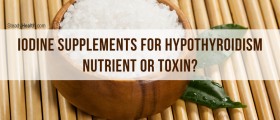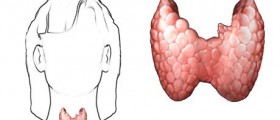
Iodine deficiency and its impact on human health
Severe iodine deficiency can provoke numerous health disorders, including the endemic goiter, hypothyroidism, cretinism, lower fertility rates, amplified infant mortality, and mental retardation. People living in Himalayas, the European Alps, and the Andes, and consuming only locally produced foods are at the greatest risk of developing iodine deficiency, since they live in areas with low natural iodine levels. Recommended dietary intake for iodine is 100-150 mcg/d, and richest food sources include salt water fish, seaweed, and some grains. Plants grown on iodine-rich soil are also rich in this mineral.
Signs and symptoms of iodine deficiency
Low iodine levels affect the normal values of thyroxine, which is one of the two thyroid hormones. High levels of this hormone stimulate numerous bodily processes, including the cellular growth and development of the goiter, which is a swelling of the thyroid gland. Goiter presents as swelling, hoarseness, shortness of breath, cough, or dysphagia. Goiter is usually treated with iodine supplementation, and in most of the world it is made endemic.
Iodine deficiency is also associated with mental retardation. Moreover, it is one of the main causes of preventable mental retardation worldwide. Iodine deficiency reduces one’s IQ capacity for 10 to 15 points. Other associated problems include deaf-mutism, squint, disorders of stance and gait, stunted growth and hypothyroidism. All of these symptoms are collected under the name cretinism, which designates severely stunted physical and mental growth due to untreated congenital deficiency of thyroid hormones, which occurs as a result of maternal nutritional deficiency of iodine.
Iodine deficiency obstructs normal functioning of numerous body systems, including lactating breast, gastric mucosa, salivary glands, oral mucosa, etc. Iodine deficiency is associated with breath cancers and fibrocystic breast disease. It is also correlated with certain stomach cancers.
Risk factors for iodine deficiency include selenium deficiency, pregnancy, radiation, and smoking tobacco, drinking alcohol, and taking oral contraceptives. Patients of any age can be affected with this disease.








-And-Children-16-Warning-Signs-And-Symptoms_f_280x120.jpg)




-In-Infants-And-Older-Children_f_280x120.jpg)



Your thoughts on this
Loading...